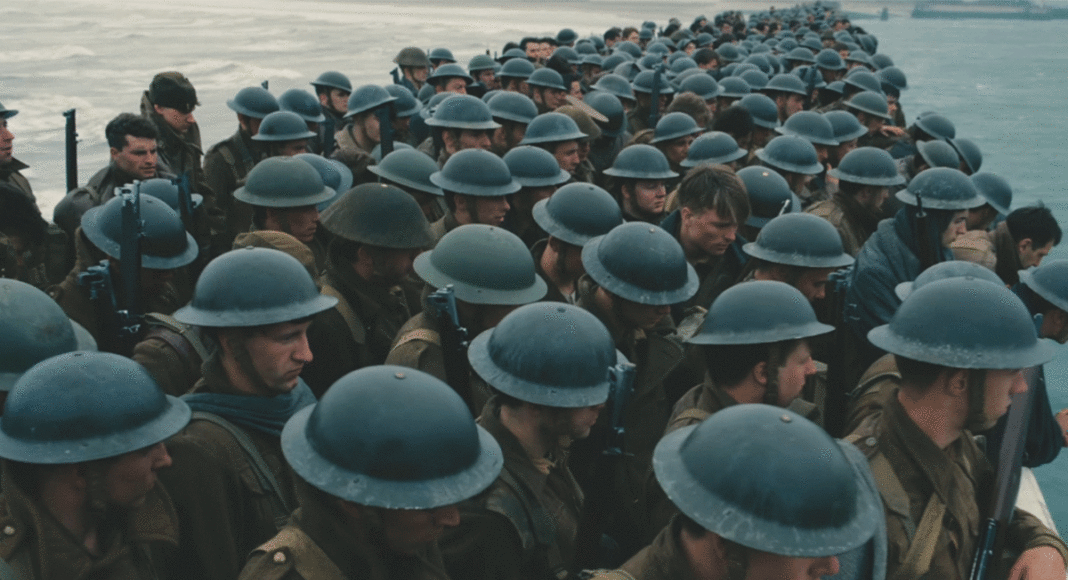Think of the different battlefronts in World War II. Now choose the one you are the gladdest that you missed. The Golden Staircase in New Guinea? Saipan? The Ruhr cities under the RAF night bombing missions, or the London blitz? That great engineer of cage-rattling cinema, Christopher Nolan, convinces you that Dunkirk ought to be way up on the list.
On the cusp of May and June 1940, tens of thousands of troops from the British Expeditionary Force were pushed to the sea at the resort town of Dunkirk, France, by the sudden collapse of the French army. A character here describes the soldiers, lined up and waiting to be ferried back home, as “fish in a barrel.” It’s more like the machine-gunning of a sardine can. Strafing planes and dive bombers decimated the crowd waiting for rescue.
Nolan makes up a triptych with war’s relativity—time stretching or standing still in the presence of death. It’s one hour with a patrolling Spitfire pilot called Farrier (Tom Hardy, muffled with an oxygen mask—Nolan masked him again, after The Dark Knight Rises). We spend one day with Mr. Dawson (Mark Rylance), the captain of the pleasure boat The Moonstone, wearing a sweater and tie into the war zone, just one of that motley armada of seacraft requisitioned by the Royal Navy. And we spend a week with some nigh-mute soldiers (Fionn Whitehead, Harry Styles and Damien Bonnard) who have an unspoken compact to escape together. In different combos, these soldiers pose as medics, and then they survive one shipwreck, then another, and then another. Part of their traumatic journey is spent hiding in a ship, waiting for the tide to rise as bullets burst through the bulkheads—it’s as much of a wringer as the scene in Das Boot when the water pressure blew the rivets out like .45 slugs.
If it’s less cohesive than the James Ensor-worthy horror carnival in Atonement (2008), Dunkirk is an ordeal in which every facet is stomach-turning with tension. Nolan’s borrowing from Hitchcock is a series of studies of the cornfield scene in North by Northwest, with a plane’s machine guns taking your measure as they wheel and descend. Hans Zimmer’s slow rumblings—often drowning out the dialogue—winch up the nerves. Hoyte van Hoytema’s photography is an eerie blue-white palette that looks like the afterlife has already begun. The depth of field is especially powerful in the scenes of Farrier’s pursuit of the Luftwaffe planes. I can’t recall a WWII flying spectacle cut with such power. We get claustrophobic in a cockpit, as Farrier tries to reckon his remaining fuel with a smashed gas gauge. It all seems so uncertain: the gilded flicker of the gun sight’s spiked circlet when the sun strikes it, the frustration of shooting and shooting and not striking.
Nolan said he favors action over character, here; in this situation where fleeing or standing fast give you the same slim chances, it’s a movie about who will survive. Rylance gives the most performance with the least material; facing danger on both legs of the trip after he picks up an unstable lone survivor (Cillian Murphy, billed as “Shivering Soldier”). Dawson has the sort of bravery that’s a close kin to shock. At the end, when he wordlessly nods at an obituary in the local paper, one judges that this nod is as much as he will ever say about the war for the rest of his life. Kenneth Branagh, hired for our memories of Henry V, glowers at the horizon line, but there’s little payoff. He ends up playing a war memorial, really, when the film commences its fulsomely elegiac last stage.
Dunkirk misses the grim humor in Len Deighton’s histories of the war, or some other indication of how the Miracle of Dunkirk proves the importance of being lucky over being smart. Churchill propagandized a humiliating retreat as a brave regrouping, in one of his noblest speeches—his words are read aloud haltingly from a newspaper at the end of the movie. Our last shot of a survivor’s look of wonder, realizing the size of the feat. One could just as easily have finished with a caption: “And then, the war began in earnest.”
Dunkirk
Written and directed by Christopher Nolan. Starring Fionn Whitehead, Tom Glynn-Carney, Kenneth Branagh and Cillian Murphy. PG-13, 120 mins.














